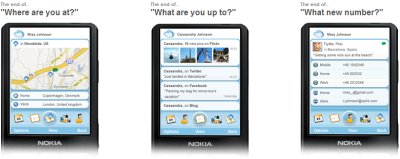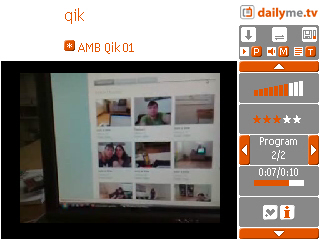Three weeks ago I attended a press workshop at Nokia Maps, which has its developer center here in Berlin. I already wrote about it in this article. They showcased the latest functionalities of Nokia Maps 2.0 and how it can be connected over the internet with other services. "There are 60 billion phonebook entries on Nokia cellphones", said Michael Halbherr, CEO of Nokia gate5 GmbH. "That's the biggest social graph of the world." In the near future a Nokia cellphone's address book shouldn't show only phone numbers. A click on a name will also reveal the friend's actual location, what he does and what are his plans for later. Every entry becomes a node in a social network, as we already know it from Facebook, LinkedIn, XING or the like.
That's why in July 2008 they bought the German startup Plazes, also from Berlin. It let's you see on Google Maps where your friends are if they have entered their location either on Plaze's website, by SMS or through an automatic Wifi localization. Soon Plazes will become a part of Nokia's Ovi and work with Nokia Maps on mobile handsets. It will make use of the cellphones' GPS facilities.
The funny thing is that yet for weeks Zyb is announcing the same functionalities on their website. In the last months Zyb has developed from a simple tool for internet backups of cellphone numbers into an outgrown social network. The features on their website remind me of Plaxo Pulse and are all based on mobile phonebook entries.
But the real interesting stuff comes with their mobile software which is being announced on their website but cannot be downloaded yet. At least not with the 4 different mobile phones I have tried. Also there is no press release, which could have explained more, but that could be part of a viral strategy. At least blogger Pat Phelan got wind of it quite early and I heard from other exclusive previews. The new Zyb features look stunning and resemble quite exactly what Nokia has announced as future plans for Plazes:
The end of... "Where are you at?"Vodafone bought Zyb in May 2008 for $50m, just some weeks before Nokia snapped up Plazes. Zyb's screenshots remind me very much of the Powerpoint about Plazes' mobile future.
If your friends allow you to, you'll be able to see where they are right this minute. No more texting everyone from the restroom Friday night.
Using location technologies - and your own text input - the ZYB Phonebook quietly and securely transfers your location only to those you allow to see it.
The end of... "What are you up to?"
Show your ZYB shouts as your status line, let your friends see your Facebook status or Twitter tweets.
Millions of people including some of your friends already tell various services what they're doing right now. We'll use that information and combine it with ZYB shouts and your phone's calendar to show your friends what you're doing. If you allow them, of course.
The end of... "What new number?"
"The number you've dialled cannot be reached". We hate her voice as much as you do, that's why the ZYB Phonebook updates your friends' phone numbers automatically.
In ZYB there's no such thing as outdated contact information. The minute your change your own phone number, it is distributed to your connected friends in your ZYB Phonebook. They'll simply have your new info as soon as they sync their phones.

New Zyb mobile app brings Twitter, Facebook, Plazes and LBS.
To me it seems that both applications will do basically the same, only that Vodafone's Zyb is nearer to market. On Wednesday I will probably get more information because I do an interview to a person involved.





















